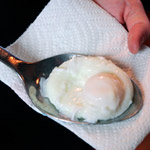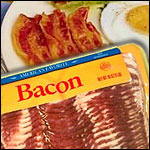Breakfast Articles > Ask Mr Breakfast


|
Dear Mr Breakfast,
Why are eggs associated with breakfast in so many countries?
- Steve
|
 Great question Steve from Lyon, France. Let's get in the time machine.
Great question Steve from Lyon, France. Let's get in the time machine.
Hold on!
First stop: Ancient Greece. Whooosh!
Welcome to Athens Steve. If you squint, you can see a little farm house. Do you see it? That chicken in the pen is the very first "domesticated poultry". Prior to this point, chickens ran as free as squirrels in our modern society.
From this moment on, cookbooks would feature egg dishes of many varieties -- omelettes, souffles and even custards. A funny thing though, egg dishes were being consumed more in the evening hours than in the morning. We must travel far into the future to see eggs strongly associated with breakfast.
Zooooom! America, 1900.
According to Lowell K. Dyson's article American Cuisine in the 20th Century (FoodReview, Volume 23), categorizing food-items as breakfast, lunch or dinner still wasn't happening at the turn into the 20th century.
Do you see that guy's breakfast? Which guy?! That fat guy in the window. That, my friend, is a traditional breakfast for this time period. You're seeing correctly: steak, oysters, roast leg of lamb, pork chops and fish. Some days, he has scrambled eggs -- twice a week or so. The only thing consistent with today's perception of breakfast is his coffee.
So what's going on? Eggs are moderately popular in the early 1900s. What I'm wondering now isn't so much why eggs became popular at breakfast, but why oysters, fish and all that other stuff became unpopular.
Let's consider that question as we slowly head back to present time. Shwoooosh!
To understand why we no longer eat five-course breakfasts (five of which were meat), let's look at my Uncle Art, a heck of guy with an astute outlook on life and comfortably jolly belly. When he was dieting, he would say to me, "Thin is in. Fat is not where it's at." When he resigned himself to a more comfortable weight, he'd say "Fat is where it's at."
In essence as a nation in the late 1800's, fat was where it was at. Men loved meaty, full-bodied women. As for men, if you were chubby, you were considered healthy.
Then something happened. We're passing over it right now. The first nutritionist. When science came into the business of breakfast, out went the steak and pork chops. Suddenly, high cholesterol was a bad thing. Fruit and vegetables, long considered a waste of time, were heralded as "vitamin-rich" and "low in fat". (Our fat buddy from the early 1900's was taught that vegetables didn't provide enough energy to chew them.)
Thin is in. Look down. You can see the women getting thinner with each passing year. Gosh, if we pass our own time, we won't be able to see them!
So, the beef, the fried fish, the oysters... all gone from the breakfast plate. Yet as we time-travel over the 1950's, we see omelettes and scrambled eggs all over the place. What in the heck is going on? How did eggs survive the meat revolt?
I propose two reasons eggs survived.
People never really considered eggs to be meat. They are considered part of the meat group by every credible food organization, yet the public never seemed to fully adopt that classification. Look at every other vegetarian you know. "Oh but I eat eggs and fish," they say. They believe eating beef and chicken is horrible and unhealthy -- but baby chickens... "Oh, that's not really meat."
The fickle sensitivity of vegetarians is a prime parallel to the fickle and often-changing sensibilities of the American public. Which brings me to reason number two the egg was saved - The Incredible Edible Egg.
There is no question that eggs would have also been banished from breakfast if it wasn't for the efforts of the egg lobbyists. As recently as the 1980's, nutritionists were waging war against our oval friends. See it?
Egg producers weren't about to let breakfast get away, so they mounted a counter-campaign. As it so happened, eggs weren't the devils that the nutritionist made them out to be. (Watch for further nutritional reports in upcoming Mr Breakfast columns). The egg producers won the media battle and in so doing, they cemented the egg's association to breakfast for the foreseeable future.
We could travel there now, but who the heck wants to see those horribly skinny women. I'll drop you off here Ken -- back in 2009, a time I call breakfast time. I hope I answered your question. Have a great breakfast tomorrow and please don't tell anyone about my time machine.
Your pal,
Mr Breakfast
This article was written by Mr Breakfast (aka Eddy Chavey).
More Answered Questions:
The editorial content above may not be reproduced without the written permission of
Home | About | Contact | Breakfast Recipes | The Cereal Project | Site Index | Food Charities | Blog
©2024 MrBreakfast.com
©2024 MrBreakfast.com





